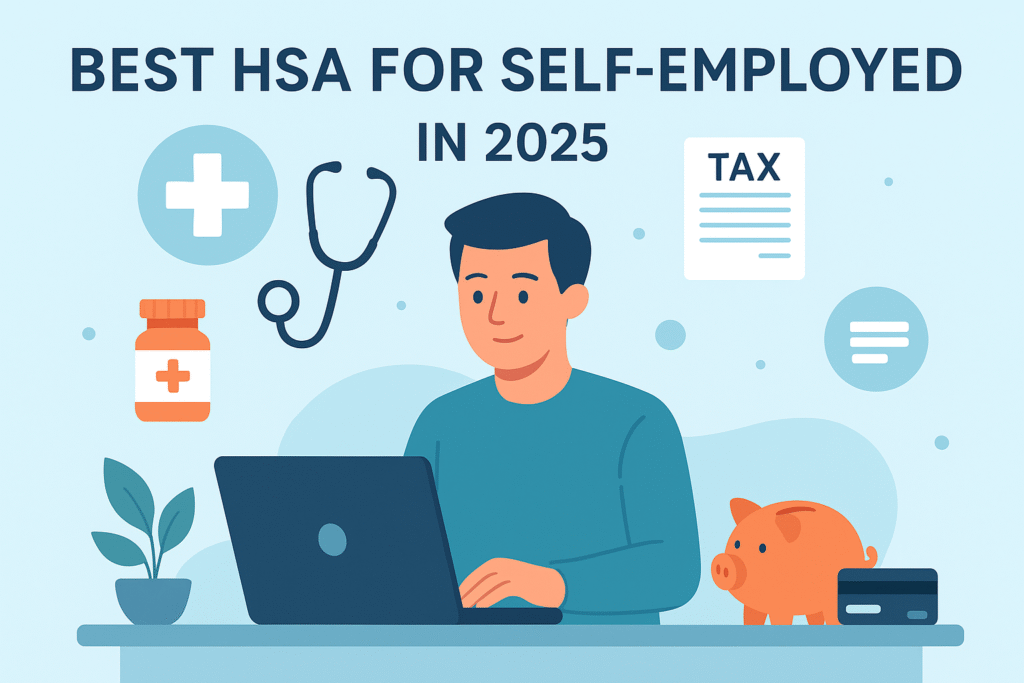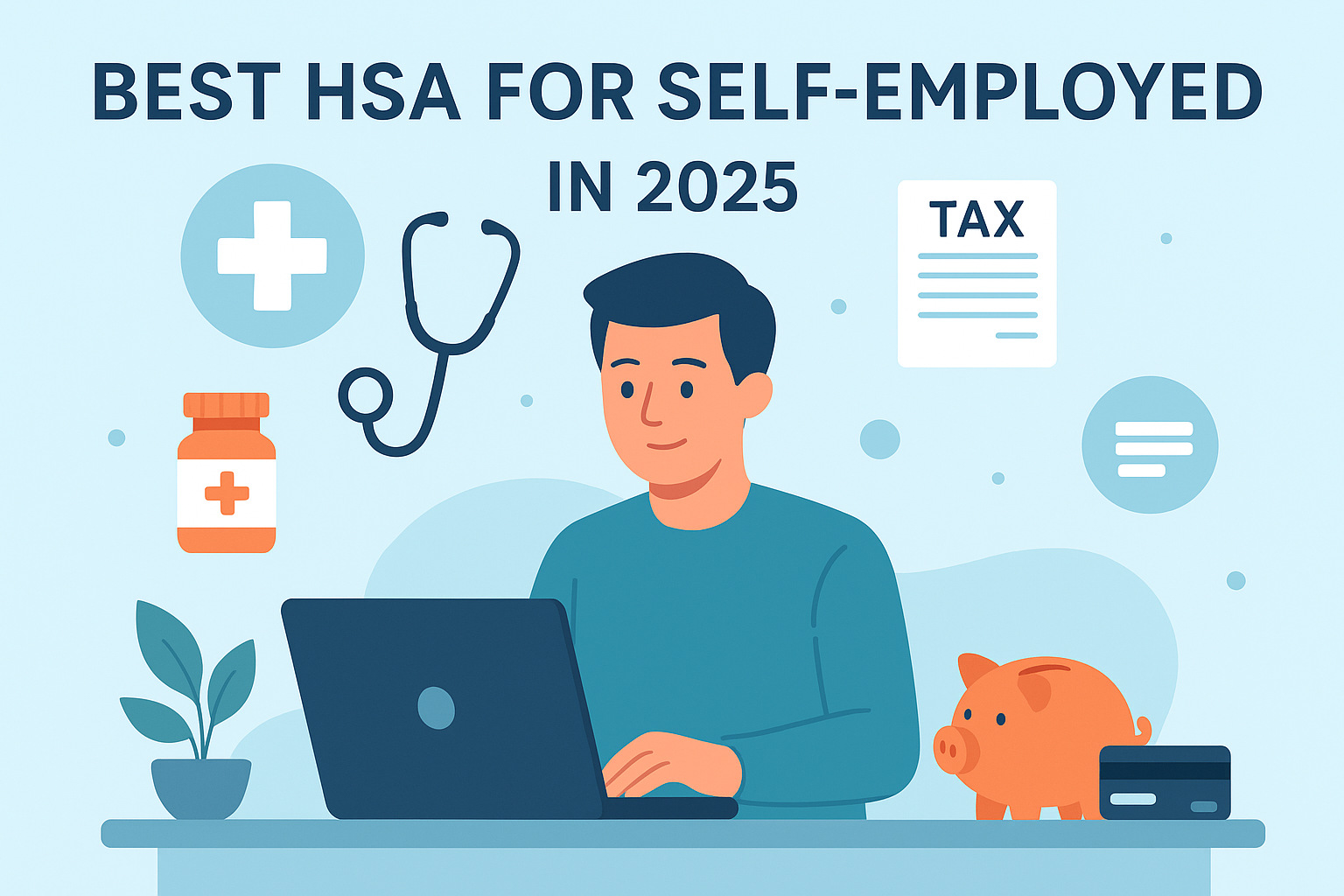
Best HSA for Self Employed in 2025: A Complete Guide
If you’re self-employed in America, managing healthcare costs can feel overwhelming. Unlike traditional employees, you don’t get employer-sponsored insurance, which means you’re fully responsible for covering premiums, doctor visits, and even unexpected medical bills.
That’s where a Health Savings Account (HSA) can make a big difference. HSAs give you a triple tax advantage—you contribute pre-tax dollars, your money grows tax-free, and withdrawals for qualified medical expenses are tax-free too.
But here’s the big question: Which is the best HSA for self-employed Americans in 2025?
Let’s break it down in plain English.

Why HSAs Are Perfect for the Self-Employed
If you’re running your own business, freelancing, or gig-working, an HSA can help you:
- Save on taxes: Contributions lower your taxable income.
- Cover medical expenses: Pay for doctor visits, prescriptions, dental, vision, and even some over-the-counter items.
- Invest for retirement: If you don’t use your HSA funds now, they roll over year after year—and after age 65, you can even withdraw for non-medical expenses (like a 401k).
- Flexibility: No employer rules—you choose your provider, your contribution amount, and your investment strategy.
What to Look for in the Best HSA Provider
Not all HSAs are equal. As a self-employed person, you should look for:
- Low or No Fees – You don’t want monthly maintenance fees eating into your savings.
- Good Investment Options – Mutual funds, ETFs, or stocks if you want your HSA to grow.
- Easy Access – A debit card, mobile app, and smooth online experience.
- Strong Interest Rates – For cash you’re not investing.
- Nationwide Availability – Since you don’t have an employer, you need a provider open to individuals.

Best HSA for Self Employed in 2025
Here are the top picks based on fees, investment choices, and usability:
1. Fidelity HSA – Best Overall
- Why it’s great: No account fees, no minimum balance, and access to thousands of investment options (stocks, ETFs, mutual funds).
- Perfect for: Self-employed people who want to invest their HSA for long-term growth.
- Extra perk: High cash interest compared to competitors.
2. Lively HSA – Best for Simplicity
- Why it’s great: Zero maintenance fees, very user-friendly, and investment options through Charles Schwab.
- Perfect for: Freelancers and gig workers who want an easy-to-use account with good support.
- Extra perk: A modern app with transparent, no-hidden-fee policies.
3. HealthEquity – Best for Frequent Spenders
- Why it’s great: Strong customer support, nationwide availability, and debit card for everyday use.
- Perfect for: Self-employed workers who will use their HSA regularly for medical expenses rather than long-term investing.
- Watch out: Higher fees than Fidelity or Lively, but convenient if you’re spending often.
4. First American Bank HSA – Best Low-Cost Option
- Why it’s great: No monthly fees and solid investment choices via Vanguard and Schwab (with a small balance requirement).
- Perfect for: Budget-conscious self-employed workers.
- Extra perk: Easy to set up directly online without employer involvement.
5. Optum Bank – Best for UnitedHealthcare Users
- Why it’s great: If you already have a UnitedHealthcare plan, Optum integrates smoothly. Offers investing once you hit minimums.
- Perfect for: Self-employed individuals with UHC health insurance.
- Watch out: Some fees and higher minimums for investments.

Comparison Table: Best HSAs for Self-Employed
| Provider | Fees | Investment Options | Best For |
|---|---|---|---|
| Fidelity | $0 | Stocks, ETFs, mutual funds | Long-term investors |
| Lively | $0 | Charles Schwab | Simplicity + no fees |
| HealthEquity | Some fees | Mutual funds, ETFs | Frequent HSA spenders |
| First American | $0 | Vanguard, Schwab | Budget-friendly choice |
| Optum Bank | Some fees | Mutual funds, ETFs | UnitedHealthcare customers |
How Much Can You Contribute in 2025?
For 2025, the IRS contribution limits are:
- $4,300 for individuals
- $8,550 for families
- +$1,000 catch-up contribution if you’re 55 or older
Final Thoughts: Which One Should You Choose?
If you’re self-employed, the best all-around HSA in 2025 is Fidelity. It’s fee-free, has excellent investment options, and works whether you want to save short-term or invest for the future.
But if you value simplicity, Lively is a fantastic choice. If you’ll be spending often, HealthEquity gives you easy access.
👉 The good news? You’re in control. Unlike traditional employees, you’re free to choose the HSA provider that matches your financial goals.

FAQs: HSAs for the Self-Employed
1. Do I qualify for an HSA if I’m self-employed?
Yes—but you must be enrolled in a high-deductible health plan (HDHP).
2. Can I deduct HSA contributions from my taxes?
Absolutely. Contributions lower your taxable income, even if you’re self-employed.
3. What happens if I don’t use my HSA funds?
They roll over every year and can grow tax-free through investments.
4. Can I open more than one HSA?
Yes, but your total contributions across all accounts cannot exceed the annual IRS limit.
🔗 IRS – Health Savings Accounts (HSAs)
This is the official IRS guide on HSAs (Publication 969). It explains eligibility, contribution limits, and tax advantages.
👉 You may also like reading our detailed guide on Can I Use My HSA for Dental Implants in America 2025?

